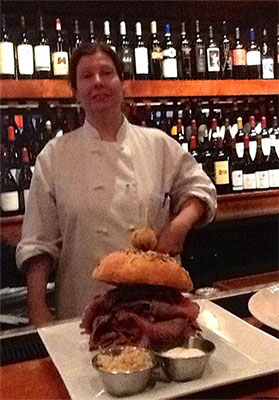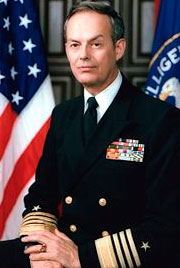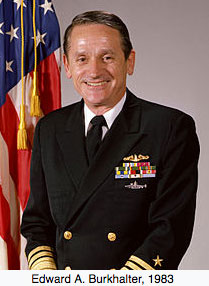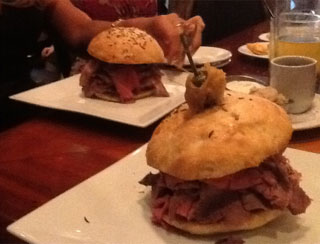
(Willow’s co-owner Tracy O’Grady with one of her famous beef-on-Kemmelweck sandwiches).
Willow was jumping. It was the last Friday of the month, the evening Tracy O’Grady added the famous Beef on Weck sandwich from her native Buffalo, N.Y., to the menu. Mac and I normally did not meet on the most hectic of weeknights, but he had a function on our usual Thursday over at the Virginia Hospital Center where he was a mentor and teacher for the Men’s Prostate group and the Alzheimer’s Support group. Admiral Showers is still a bundle of energy at 92 years of age.
“Are you going to have one of the sandwiches?” I asked Mac. “We should get our orders in early if you want one before they sell out.”
“No, I have seen them before and it is just too much food for me.”
“I manage to stretch mine out for almost the whole weekend,” I said. Or eat one here for dinner and get another for take out. Those sea-salt and fennel-crusted Kemmelweck rolls that Kate Jansen bakes, couple with the locally-raised, hormone-free and pasture-bed beef, slow-cooked as steamer roasts and thinly sliced are simply heavenly.”
“Sounds like you should go into Willow’s marketing department, chuckled Mac. “I feel the energy of the crowd, but the docs have me off beer again. So I think I will be a man of moderation this evening.”
“I can avoid anything but temptation,” I said, taking a sip of Happy Hour Chardonnay. So, last time we got together we were talking about counterintelligence and your last few years at the IC Staff. What else were you involved in?”
“One of our more prominent areas of activity in the early ’80s was technology transfer. We were just beginning to realize that we were under constant attack by the Russians and the Chinese for our intellectual property.”
“It has only gotten worse. Every time the Chinese roll out a new weapons system it looks suspiciously like one of ours.”
“Yes. It’s very aggressive and very controversial today but we were just trying to get our arms around what to do about the massive theft of our information.”
“Yeah. Imagine if someone could hack into the databases in the security offices. Bad actors could steal our personal information and then take our identities.”
“Quite a chilling thought, isn’t it? I am sure the people at OPM are all over it. But back when we first realized what was happening, it evolved into such a large concern that the DCI created a Technology Transfer Committee under the United States Intelligence Board- the USIB- in the IC. They also created an analytical office in CIA to analyze the technologies and the various kinds of acquisition by the opposition. We worked hand in glove with that office because what they were identifying related to our responsibility to recommend action to block as part of our countering efforts.”
“How did that work?” I asked. “You would identify weak problem areas and get the agencies to do their part?
“We did an annual assessment and published it in intelligence channels, but to a fairly broad audience. The real function of the office was following the original inventory of counterintelligence resource and capabilities in the U.S. government. That led us into an annual assessment of the threat amassed against us that our existing resources should be able to counter. By doing this assessment annually, we afforded the agencies and the program and budget review people and the planners and whatever the basis for saying: “We’ve got to put more emphasis here,” he said, gesturing in the direction of the amazing sandwich that Jon-Without was studying on the bar in front of him. “More over there, perhaps less here,” so that we could do a more effective job in defending ourselves. I don’t like to use the word “security,” but that probably is the best word that we’re talking about overall.”
“We like to change our buzzwords around in the IC,” I said, hoping that my sandwich would be out soon. “It makes it sound like we know what we are doing.”
“I understand the desire. I have been watching it happen for just about seventy years. We’re talking about our own national security and how we protect it. But in the early ‘80s, we were clearly breaking it down into all of its identifiable parts and looking at each one individually and looking at the programs that the U.S. Government had to protect against those various means of intelligence collection by the opposition so we could identify our efforts against them. So we put out these annual assessments, and those assessments went to Congress, and they went to the White House, and they went to all the agencies in government, and they actually made recommendations as to where new emphasis should be given, and what new programs that should be developed. One of the last ones I participated in in 1982, for example, made strong recommendations that the FBI should be given substantial resource increases to augment their agent effort against the Soviets.”
“Those Russians. Mitt Romney got in such trouble for suggesting that they were still an existential threat to America.”
“The FBI, at that time as I recall, had a ratio between their agents on the Soviet desk against the hostile Soviet agents as something like one in twelve or one in fifteen. We thought they ought to get it down to like one in four or one in three”
“That is a much better ratio. We were in New Delhi one time, meeting with the Indian Services after the Pakis tested their atomic bomb. The CIA Chief of Station told us the Indians had a team of fifteen or twenty people assigned to follow him or his Case Officers around all the time. Very hard to be an effective clandestine operator with a dozen sets of eyes looking over your shoulder all the time.”
“I should imagine. It was not so very different here, though the odds were in favor of the opposition. Over time, Congress agreed with our assessment and granted the FBI a substantial increase in their agent capabilities to better match the hostile threat that was being mounted by the Soviets. We then come into the “Year of the Spy.” I think those efforts were successful.”
“Yeah, but at what cost! The Walker ring would have guaranteed that a lot of us would have been killed if the balloon went up.”
“In an ideal world, my recommendation was that FBI to KGB or GRU ratio ought to be one-on-one. Any Soviet in this country ought to be under surveillance most all the time so that if he went out to the Maryland countryside to clear a dead-drop, some FBI agent was following him and would see where he was going. If you ever had an ideal situation like that, I would think the Walkers and others would have been found out a lot sooner than they were. But the FBI was not capable of doing that because they simply didn’t have the resources to do it.”
“Follow the money,” I said. “It really is all about resources,” I said.
“We certainly improved their budget authority. We may not have made it perfect, but we improved the resources. I’m not claiming it, but I’d like to think the espionage cases that have been revealed in recent years are perhaps the result of having given the FBI a better capability. Those were the kinds of things we did. We worked closely with NSA, for example, to work against known hostile intercept activities against our communications. Again, it’s more than security. You’ve got to work against installations and facilities and people.”
“I hear that. I was tagged one weekend with escorting- baby-sitting, really- a delegation of the Russian State Duma after the end of the Cold War. We thought it was a great idea to take them down to the Navy base at Dam Neck near Virginia Beach. It was a zoo, since at least two of the Russians were from the Embassy and obviously members of the security services. I saw one of them wander away from the Bachelor Officers Quarters where we were staying and started towards the compound where SEAL Team 6 was located. When we got back to DC I couldn’t find anyone in the FBI who cared.”

(ADM B.R. Inman as Deputy Director of Central Intelligence).
“Perhaps you should have tired the NCIS people. They have excellent television shows.” Mac laughed. “Well, after the departure of Stan Turner and Mr. Casey’s assumption of DCI responsibility and when Bobby Inman came in as the Deputy DCI, there was a conscious effort made, mainly by Admiral Inman, to return the community counterintelligence function to the IC Staff as opposed to making it a function of the DCI’s immediate front office, as it had been under Turner. This was done with the exception that we did not move out of the Langley headquarters. We remained at the Langley headquarters, but we became re-identified as an element of the IC Staff. I then coordinated my activities with the Director of the IC Staff, and I would attend the IC Staff weekly section chief meetings, and we were more active in the IC Staff. That happened under the staff directorship of civilian John Kohler, who was there for a while, followed by Vice Admiral Al Burkhalter who was later the chief of the IC Staff in his own right.”

“I think I met the admiral one time after he retired. He was an impressive guy.”
“He was still on the job up to and beyond my departure and second retirement. We continued to issue our annual assessments. We got increased recognition and notoriety for what we were doing. I don’t think we ever resolved the basic problem of suspicion that the operating counterintelligence agencies had for our community umbrella. They thought we were looking over their shoulders and trying to see their secrets. Even though we gave them major assistance in the acquisition of resources to fill in their weak spots and help them accomplish their mission more effectively, I don’t think we ever gained their full confidence. Of course, Judge Webster as DCI could be expected to have appreciation for the counterintelligence problem as a result of having been previously the Director of the FBI.”
“So, you retired in June of 1983?”
Mac nodded, lost in thought. “Yes I did,” he said. That was when Billie started to have problems. But I did not retire. I became a caregiver for the next ten years.”
“That is quite a change in roles. It must have been a real stressful decade.”
“Hardest job of all of my careers,” said Mac. “And the struggle, unlike the Pacific War, big as it was, in the end one that could not be won.”
I knew most of this story, since we had talked for years about what was happening to my parents in their little Village By The Bay in northern lower Michigan. Mac had provided some wisdom along the way, as my family dealt with the slow decline and eventual passing of my father and mother. His wisdom and support contributed mightily with coping- as it did for all those people he helped along the way.
I was delighted to see a parade of sandwiches coming out of the kitchen and headed in the direction of The Amen Corner that was destined to be the center of our world for the next several minutes, complete with the deep-fried olives, sides of sautéed onions and Tracy’s home-made horseradish sauce. Mac could see that constructive conversation was DOE until our corner of the bar was sated, and he settled up the tab with Boomer the bartender, said farewell to the other Regulars on his way to the door, and slowly headed out into the evening.

Copyright 2017 Vic Socotra
www.vicsocotra.com
